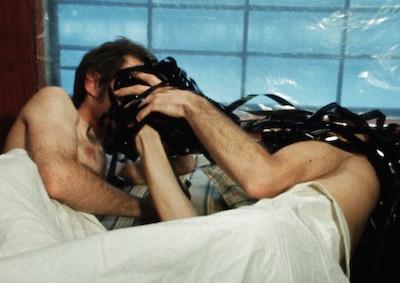Pictured above: Blackstar: Autobiography of a Close Friend (dir. Tom Joslin, 1977)
The Archive has postponed in-person screenings in consideration of the current COVID-19 surge. This program has been rescheduled to Sunday, March 20 at 7 p.m. We appreciate your understanding and support as we plan for a safer start to 2022.
Preservation funded by The Andy Warhol Foundation of the Visual Arts and IndieCollect Donors Circle
Blackstar: Autobiography of a Close Friend
1977
In this experimental, self-ethnographic 1977 documentary, Tom Joslin (1946-1990) blends breathtaking, moving snapshots from the natural world, filmic cultural touchstones, and cutting (pseudo) cinema vérité to dissect and reassemble his gay identity despite constant warnings to stay in the closet. Blackstar sees Joslin and partner Mark Massi fleshing out their enduring commitment and shining, obvious love for one another amidst the insecurity that a self-conscious documentary lens instills. As interviews with Joslin’s mother, father and brothers attempt to break down the legitimacy of Joslin and Massi’s romance, the pair use everything at their disposal, including inspiration from gay revolutionaries and painfully honest conversations, to hold up their “abnormality” as a point of pride rather than shame.
Blackstar serves as a prelude to Joslin’s devastating and groundbreaking Silverlake Life: The View from Here, which documented his and Massi’s tragic battle with AIDS, and won the Sundance Grand Jury Prize in 1993. The third film in his limited repertory, Architecture of Mountains, was completed by students at Hampshire College in 2013, from a collection of interviews with former filmmaking students of Joslin’s, and production notes written before his death. Rarely shown, it continues Joslin’s interest in the evolution of experimental, non-fiction filmmaking, and what nature and human consciousness can learn from one another.
That Joslin’s career was cut short by the devastation of AIDS is made all the more poignant by the power of his eye and heart. In Blackstar perhaps more than any of his other films, he unflinchingly captures casual devastation, meditations on premature loss, and his own determination to stop lying—actions which serve as reminders to reach for personal and political self-love at every turn.
—Shayna Warner
DCP, color, 85 min. Director: Tom Joslin. New 4K restoration by IndieCollect and the UCLA Film & Television Archive.
Preservation funded by The Andrew J. Kuehn, Jr. Foundation, Outfest and Women's Film Preservation Fund
Choosing Children
1985
In 1984, Choosing Children was one of the first documentaries to challenge homophobic and sexist attitudes about lesbian parenting. This was Debra Chasnoff (1957-2017) and Kim Klausner’s first venture into documentary filmmaking. The project was inspired by questions that the filmmakers, who were also life partners at the time and would eventually have two sons together, were asking about the social and legal landscape for being a lesbian parent.
The pair ran ads in gay and feminist newspapers determined to find a broad selection of lesbians across race, ethnicity and reproductive circumstance who had decided to have children since coming out. The film profiles six different families, all unique in different ways and each connected by a lesbian parent. Some women chose to use a sperm donor; one partnered with a gay man to conceive and co-parent; and a few chose the “old fashioned” way of becoming pregnant. Some families are structured in the traditional two-parent partnership, while others have come together with multiple women to group-parent a child.
Chasnoff and Klausner pay close attention to the legal landscape of lesbian parenting: the discriminatory laws that refused to recognize same-sex parents who were not biologically related to their children, and the often equally prejudiced policies governing artificial insemination that rejected lesbian clients based on their sexual orientation. In this way, the documentary serves as a “how to” guide for parents to protect their reproductive rights and help them understand how to make the choices that are best for themselves and their families. One mother even offers some sage advice on the best container for a “do-it-yourself” semen sample: marinated artichoke heart jars are highly recommended.
—Maya Montañez Smukler
35mm, color, 45 min. Director: Debra Chasnoff, Kim Klausner, Margaret Lazarus. Preserved by the UCLA Film & Television Archive.






 Mobile Navigation
Mobile Navigation

